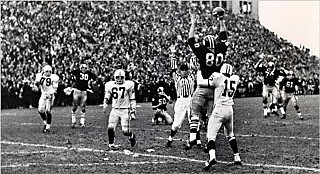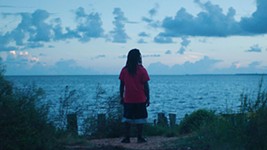It's a Landslide ... Tie!
AFS Documentary Tour: 'Harvard Beats Yale 29-29'
By Anne S. Lewis, Fri., Oct. 9, 2009
The audience for next week's Harvard Beats Yale 29-29 at the Alamo Ritz will most certainly be a mix of the following: 1) gridiron/sports fans who bought their tickets after reading the "Harvard Beats Yale" part of the title (In this group will also be the boomer-vintage Harvard, Yale, and other Ivy League alums in our midst who either attended or have heard tell of the Game of Nov. 23, 1968.); 2) doc enthusiasts, indifferent or antipathetic to the gridiron, whose attentions were piqued by the paradoxical second half of the film's title – how exactly does one team beat another in a tie?; and 3) fans of filmmaker Kevin Rafferty's oeuvre – including his 1982 film Atomic Cafe – who know he can be counted on, whatever the subject, for a good time. (He's also done camera work for Michael Moore's Roger & Me and Chris Hegedus and D.A. Pennebaker's The War Room.) None of the above will be disappointed.
For those not in the first group, the Game we're talking here is the one that took place in a universe parallel to that taking place off-campus at the height of Vietnam and Sixties turbulence, when, for the first time since 1909, longtime rivals Harvard and Yale came together when both were undefeated. Thanks to Yale's legendary quarterback, Brian Dowling (the inspiration for Doonesbury's perpetually helmeted B.D.), and running back, future NFL all-pro Calvin Hill, the Game turned out to be a big yawn, with a heavily favored (and, at the time, men-only) Yale easily maintaining a 16-point or better lead while their band oh-so-heartlessly played the theme from The Mickey Mouse Club –until the last 42 seconds of the game. What happened in those seconds would be screamed from the headlines of The Harvard Crimson and become the subject and title of Rafferty's film –a cliffhanger even though we know how it turns out.
Rafferty, a Harvard alum, set out to tell the tale by tracking down 64 players from both teams for some 40-years-after-the-fact Monday-morning quarterbacking. The players, especially the ones from Yale, were spread out all over the country, with even one in China. ("For some reason – I can only speculate," says Rafferty, "a disproportionate number of the Harvard players lived within an hour or two of Harvard Stadium.") Sixty-one former footballers agreed to let Rafferty bring his hi-def camera to wherever they happened to be and talk to him for 40 minutes. "The one big disappointment," Rafferty recalls, "was that Calvin Hill, Yale's legendary halfback – who would be a first-round draft pick with the Dallas Cowboys, Rookie of the Year, and eventually an inductee into the NFL Hall of Fame – declined, saying he'd talked enough about this game."
Rafferty admits to being a bit apprehensive about how he would be received by some of the ex-football players: "I'm a slightly scruffy, borderline bohemian, independent – read: often unemployed – filmmaker. Some of these guys are now captains of industry and finance. Many are not ... but certainly quite a few are millionaires and a possible billionaire or two. My concerns proved totally groundless."
In the low tech, one-man crew talks that he conducted with the former players in their home kitchens and family rooms and later intercut in the film with actual broadcast footage of the Game, Rafferty fleshes out the sometimes-surprising – and sometimes not – demographics and political views of the now middle-aged alums who battled that historic day. There's a Yale team member who roomed with George W. for three years – and we catch a cameo photo-glimpse of a young Meryl Streep dating one of the Yale team members, an anti-war activist. Not unsurprisingly, the interviews that Rafferty collected during his self-financed cross-country trek –staying in cheap hotels and racking up more than 15,000 miles on the used Audi that he bought and outfitted with a GPS –ran into their share of snafus, from the serendipitous joint interview that he so delightedly snagged when the captains of the rival teams fortuitously scheduled their interviews at the same time but which, alas, never made it into the film because he'd neglected to turn on the camera to the annoying background hum of the fridge that threatened to sabotage his kitchen interview with the until-then publicity-averse Harvard star Frank Champi.
Then there was Rafferty's interview with former Harvard offensive guard, actor Tommy Lee Jones, whose most memorable recollection of his by now well-known experience rooming with Al Gore was the clever way that Gore figured out how to play "Dixie" on their touchtone phone. "That interview began badly," Rafferty recalls. "Both of us being in the movie business, we had conflicting ideas about how to attach the little microphone to his body. I wanted to run the wire up under his shirt. He said it wasn't necessary. I won that battle, but the war was just beginning. I would ask him a question, he would stare at me for a while, and then say something. Sometimes what he said related to my question; sometimes it did not. I didn't really care because almost everything he said was interesting to me on some level. But there was tension. ... His contemplative, death-stare silences became an integral part of the interview. After about 35 minutes of this, I told him I was done and asked whether there was anything that he wished I had asked him but hadn't. He said no but that he liked hearing stories about the game." Rafferty obliged by telling him the story of how, after the game, he'd asked his father, a die-hard Eli sitting in the Yale stands across the field from his Harvard son, for his reaction to the game's outcome, to which Dad, a Marine during World War II who'd lost both a brother and many friends during that war replied, "Worst day of my life." Jones laughed for the first time, says the filmmaker, and their conversation took on new life – "with less tension."
The backstory to Rafferty's own Ivy League legacy and how he, coming from a long line of Elis,came to be sitting across the field from his dad on the fateful November day in 1968 that led to this film project and an upcoming book bears mentioning for its entertainment value. As was preordained, Rafferty did, in fact, embark on his secondary education in the early Sixties at the Yale feeder school Andover, where "reminders of my family legacy were everywhere," as both his father and grandfather had been captains of the football team before ascending to Yale. "I was a bit of a disciplinary problem," Rafferty recalls, and though he would play end on the team, he was not deemed "captain material." Nor, at that time, even college material: "I found out on the day before graduation that I would, indeed, be receiving a high school diploma only as the result of an extremely liberal interpretation of my essay, in the U.S history final exam, on the Spanish-American War." A post-high-school gap year abroad got him shaped up for another try, and this time he got into Yale, Harvard, and Columbia. "Choosing Harvard had been a no-brainer for me. My family had no connection to the place. It had been a great pleasure to inform my father –whom I loved – that I would be attending Harvard. He pretended that he hadn't heard me correctly and said: 'Hartford? Did you say Hartford University?'"
AFS Documentary Tour presents Harvard Beats Yale 29-29 Wednesday, Oct. 14, 7pm, at the Alamo Ritz. Tickets are $4 for AFS members and students and $6 for the general public. For more info, see www.austinfilm.org.









